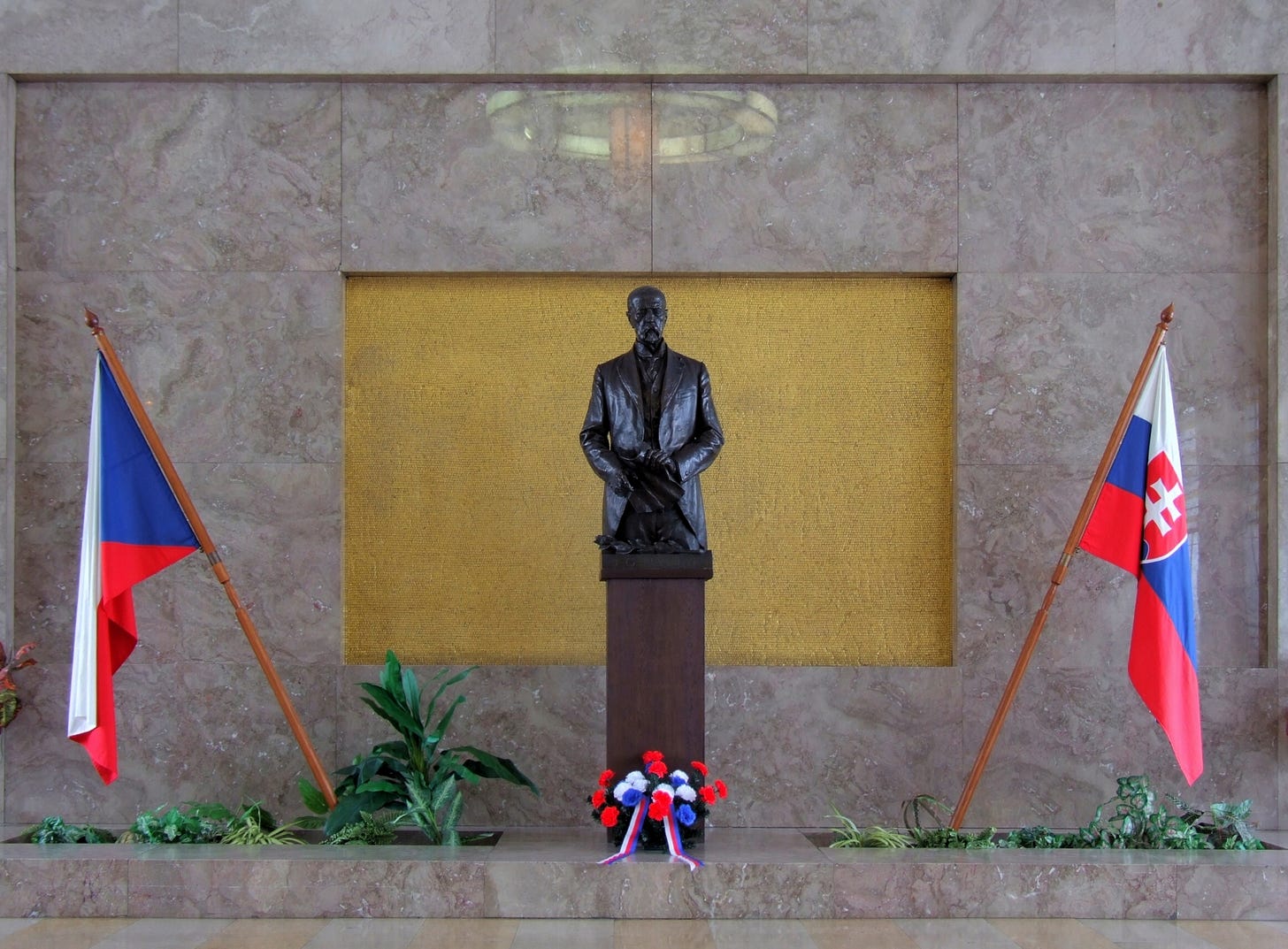First Czechoslovak president’s message unsealed after 90 years
As fascism was engulfing Central Europe, Tomas Masaryk urged his country to defend his work establishing independence.
PRAGUE — It was fitting that the author Dan Brown was here last week promoting his latest mystery thriller, The Secret of Secrets, set in the Czech capital. Just outside the city, President Petr Pavel and other dignitaries joined scholars last Friday to solve a different mystery by breaking the seal on a nearly 100-year-old envelope long believed to contain the final testament of the first president of independent Czechoslovakia, Tomas Garrigue Masaryk.
The packet held handwritten notes the president had apparently dictated to his son, Jan Masaryk, after he suffered a stroke in 1934 and was believed to be near death. He died three years later in 1937. The unveiling generated big excitement in Czechia, but in the end, the contents contained no bombshell, and it wasn’t clear why they were ever secret.
But they do show that even as he was dying, the president was thinking of his country. “I am ill, seriously ill—it is the end, but I am not afraid,” the historian Dagmar Hajkova read from the notes. “You will continue the work. You know how, but you must be careful. You know how to behave; I don’t need to tell you anything more.”
Beloved as president, Masaryk was a philosophy professor who guided the Czech and Slovak nations out of the Austro-Hungarian Empire after World War I toward democratic independence in 1918. He died after a long illness at the age of 87 before his country was seized by Nazi Germany at the start of World War II.
However, the threat of fascism was already clear to him.
Living by his credo, “Don’t lie, don’t steal, don’t be afraid,” the intellectual Masaryk is still referred to as “the liberator president,” coming perhaps as close as any leader to Plato’s philosopher king in the 20th century.
The yellowing envelope and handful of pages it contained survived a fate nearly as mysterious and twisted as the plot of a Brown novel. After Masaryk’s death, it found its way into his son Jan’s papers. The younger Masaryk served as Czechoslovakia’s representative to the United Kingdom through the 1930s, as Hitler consolidated power in Germany, posing a growing threat to his neighbors.
The Masaryks were closely connected to one of the founders of the Institute of Current World Affairs, the Chicago businessman, philanthropist and diplomat Charles Crane. He first met Tomas Masaryk when the president was still a professor in Prague in 1896. In 1904-05, Crane arranged a lecture chair for Masaryk at the University of Chicago.
In 1918, when Masaryk was leading the effort to establish an independent Czechoslovakia, Crane introduced him to President Woodrow Wilson, who became a leading international advocate. After the war, Crane’s oldest son, Richard Crane, became the first US ambassador to the newly independent country, and his youngest son, John Crane, served as Masaryk’s personal secretary. Jan Masaryk married Charles Crane’s youngest daughter, Frances Crane.
Jan was unable to help dissuade British Prime Minister Neville Chamberlain from signing the Munich agreement, which handed the Czech Sudetenland region to Hitler, in September 1938. Meeting with Chamberlain and Foreign Secretary Lord Halifax after the notorious agreement had been announced, Jan said, “If you have sacrificed my nation for the sake of peace, I will be the first to applaud you. But if not, gentlemen, then God help your souls.”
During the war, Jan served as foreign minister in the Czechoslovak government-in-exile, a post he continued to hold when the government returned to Prague after the war. In early 1948, all the other non-Communist members of the government resigned, leaving him isolated and in despair.
Less than a month later, his pajama-clad body was found in the courtyard of the Foreign Ministry building in Prague, below his bathroom window. The Communist government promptly declared the death a suicide, but that conclusion has remained in dispute. In January 2025, the Czech government opened yet another investigation into Jan Masaryk’s death.
Many of his papers were subsequently spirited abroad and ended up in Scotland. In 2005, Antonin Sum, a former secretary to Jan, donated the mysterious envelope to the National Archives in Prague with the stipulation that it not be opened for 20 years. The reason for the delay remains unclear; Sum died in 2006.
The packet was ceremoniously opened by the head of the National Archives, Milan Vojacek, on September 19, in the Baroque palace of Lany, 40 kilometers from the capital. It is the summer residence of Czech presidents and the place where Tomas Masaryk died. The president and his wife—as well as Jan Masaryk and his sister, Alice Masarykova—are buried in a modest plot in the Lany cemetery.
The notes included five pages, handwritten in English by Jan Masaryk, that seem to have been recorded in 1934. They contain instructions for his father’s funeral and the president’s thoughts on his approaching death. “People are afraid of death, but it’s nothing to be afraid of,” he said.
Masaryk also conveyed some thoughts about the issues presented by Czechoslovakia’s multiethnic population, including his advice to give the Sudeten Germans “what they deserve, but no more.”
He also urged the government to emphasize general education. “If people are uneducated and foolish, there is not much that can be done,” he said. “People are happy to be foolish—do not make it easy for them by arguing with them.”
After the ceremony, the document was taken under police escort back to the National Archives, where it will be conserved and authenticated. An official report is expected within a month.
Robert Coalson is a retired journalist who spent more than 20 years reporting on Russia, the former Soviet Union, and the former Soviet bloc for Radio Free Europe/Radio Liberty.





Good history !